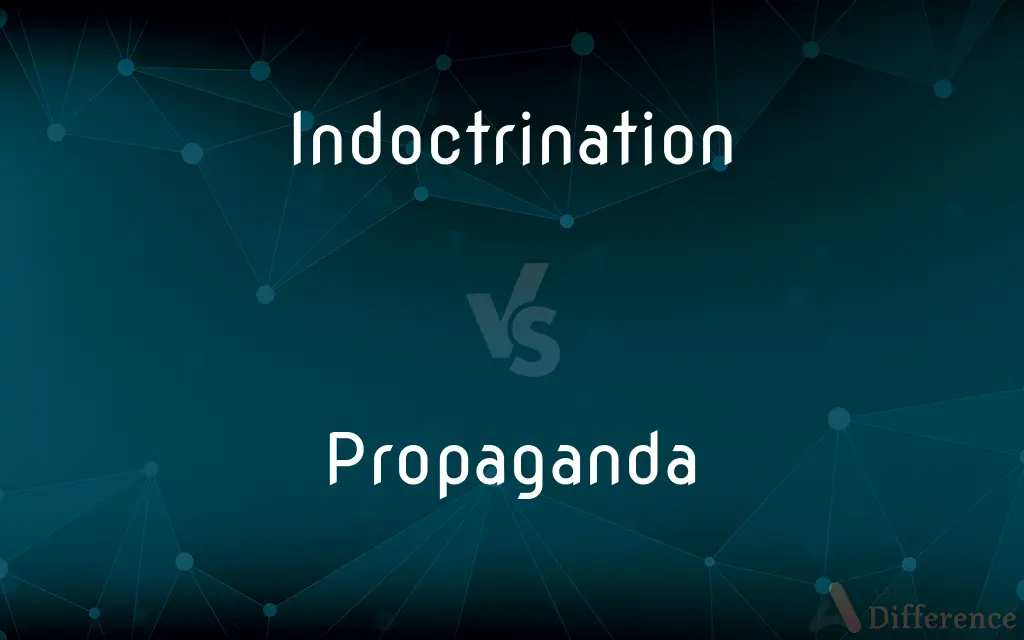Indoctrination vs. Propaganda — What's the Difference?
By Urooj Arif & Maham Liaqat — Updated on March 28, 2024
Indoctrination is the process of teaching a person or group to accept a set of beliefs uncritically, while propaganda involves spreading information, especially of a biased or misleading nature, to promote a political cause or point of view.

Difference Between Indoctrination and Propaganda
Table of Contents
ADVERTISEMENT
Key Differences
Indoctrination involves a deep, often long-term process where the beliefs and principles of a particular ideology or doctrine are imparted upon individuals, typically without encouraging critical examination or questioning. Whereas propaganda, although it can be part of indoctrination, is more about spreading specific information or disinformation to influence public opinion or behavior.
Indoctrination is commonly associated with educational or religious systems where there's a structured method of imparting beliefs, often starting from a very young age. On the other hand, propaganda is widely utilized in political contexts, during wars, or in advertising, where the aim is to sway public opinion quickly and sometimes temporarily.
Indoctrination seeks to mold an individual’s entire worldview to align with a specific set of beliefs, making it a comprehensive and immersive process. Propaganda, by contrast, often targets specific attitudes or behaviors, using emotional appeal, selective facts, or outright falsehoods to achieve its goals.
The effectiveness of indoctrination is usually measured by the long-term adherence of individuals to a belief system, indicating a transformation in thinking and behavior. In contrast, the success of propaganda is often seen in the immediate response of the audience to the message, such as a change in public opinion or an increase in support for a cause.
Indoctrination is often a more private, insidious process that occurs within closed communities or institutions, making it harder to identify and counter. Propaganda, however, operates in the public sphere, utilizing mass media, social networks, and public speeches, thereby making it more visible and, in some cases, more easily challenged.
ADVERTISEMENT
Comparison Chart
Definition
Teaching beliefs uncritically.
Spreading biased/misleading info.
Primary Context
Educational, religious.
Political, advertising.
Goal
Mold worldview to specific beliefs.
Influence opinions/behaviors.
Method
Structured, immersive.
Emotional appeal, selective facts.
Effectiveness Measure
Long-term adherence to beliefs.
Immediate change in public opinion.
Visibility
Private, within communities.
Public, via mass media.
Critical Thinking
Discouraged.
Not a focus, emotional manipulation.
Compare with Definitions
Indoctrination
The absorption of ideas without skepticism.
The educational system was criticized for the indoctrination of students in partisan history.
Propaganda
Dissemination of misleading information.
Social media platforms were flooded with propaganda during the election.
Indoctrination
Teaching a set of beliefs uncritically.
The sect's indoctrination process involved daily readings and unquestioned adherence to its doctrines.
Propaganda
Biased information to promote a viewpoint.
The government's propaganda machine was in full swing during the war.
Indoctrination
An immersive educational experience.
The indoctrination at the religious school left little room for personal interpretation.
Propaganda
Information spread for political cause.
Activists accused the corporation of spreading propaganda to discredit their movement.
Indoctrination
A method to instill a particular ideology.
Through indoctrination, the regime aimed to create loyal citizens from a young age.
Propaganda
Emotional or biased communication.
The advertisement used propaganda techniques to evoke strong emotional responses.
Indoctrination
A long-term belief system imposition.
Indoctrination in cults often isolates individuals from outside influences.
Propaganda
Techniques to sway public opinion.
The documentary revealed how propaganda was used to manipulate public sentiment.
Indoctrination
Indoctrination is the process of inculcating a person with ideas, attitudes, cognitive strategies or professional methodologies (see doctrine).Humans are a social animal species inescapably shaped by cultural context, and thus some degree of indoctrination is implicit in the parent–child relationship, and has an essential function in forming stable communities of shared values. The precise boundary between education and indoctrination often lies in the eye of the beholder.
Propaganda
Propaganda is communication that is primarily used to influence an audience and further an agenda, which may not be objective and may be selectively presenting facts to encourage a particular synthesis or perception, or using loaded language to produce an emotional rather than a rational response to the information that is being presented. Propaganda is often associated with material which is prepared by governments, but activist groups, companies, religious organizations, the media, and individuals also produce propaganda.
Indoctrination
To instruct in a body of doctrine or principles.
Propaganda
The systematic propagation of a doctrine or cause or of information reflecting the views and interests of those advocating such a doctrine or cause.
Indoctrination
To imbue with a partisan or ideological point of view
Children who had been indoctrinated against their parents' values.
Propaganda
Material disseminated by the advocates or opponents of a doctrine or cause
Wartime propaganda.
Indoctrination
The act of indoctrinating, or the condition of being indoctrinated
Propaganda
A concerted set of messages aimed at influencing the opinions or behavior of large numbers of people.
Indoctrination
Instruction in the rudiments and principles of any science or belief system; information.
Propaganda
A congregation of cardinals, established in 1622, charged with the management of missions.
Indoctrination
The act of indoctrinating, or the condition of being indoctrinated; instruction in the rudiments and principles of any science or system of belief; information.
Propaganda
Hence, any organization or plan for spreading a particular doctrine or a system of principles.
Indoctrination
Teaching someone to accept doctrines uncritically
Propaganda
Information that is spread for the purpose of promoting some cause
Common Curiosities
How does indoctrination differ from propaganda?
Indoctrination is about imparting a set of beliefs uncritically, often in a structured, immersive environment, while propaganda spreads biased information to influence opinions or actions.
What is indoctrination?
Indoctrination is the process of teaching someone to accept beliefs uncritically.
What is propaganda?
Propaganda involves spreading information, often biased or misleading, to influence public opinion or behavior.
Is indoctrination always negative?
While often viewed negatively due to its association with uncritical acceptance of beliefs, the perception of indoctrination can vary depending on the context and the observer's viewpoint.
Can indoctrination be reversed?
Reversing indoctrination is challenging and often requires exposure to alternative viewpoints and encouragement of critical thinking.
Why is propaganda effective?
Propaganda leverages emotional appeal and selective presentation of facts to quickly influence public opinion or behavior.
What roles do media play in spreading propaganda?
Media, including news outlets and social media, play significant roles in disseminating propaganda by broadcasting information to a wide audience.
How can individuals protect themselves from indoctrination?
Fostering critical thinking skills, seeking diverse information sources, and maintaining an open mind can help protect against indoctrination.
Does propaganda always involve lies?
Propaganda may involve lies, but it can also use truths presented in a biased or misleading way to achieve its objectives.
Can propaganda be a form of indoctrination?
Yes, propaganda can be used as a tool in the indoctrination process to reinforce certain beliefs or ideologies.
Are all forms of education indoctrination?
Not all education is indoctrination; the key difference lies in whether critical thinking and questioning are encouraged.
Can indoctrination have positive effects?
While controversial, some argue that indoctrination into certain ethical or moral beliefs can have positive societal effects, depending on the context.
What is the impact of propaganda on democracy?
Propaganda can undermine democracy by distorting public discourse, spreading misinformation, and polarizing societies.
What are common goals of propaganda?
Common goals include influencing elections, swaying public opinion on policy issues, and promoting consumer behavior.
How can one identify indoctrination?
Identifying indoctrination involves recognizing environments or systems where questioning is discouraged and a single viewpoint is emphasized.
Share Your Discovery

Previous Comparison
Distrust vs. Suspicion
Next Comparison
Defile vs. SullyAuthor Spotlight
Written by
Urooj ArifUrooj is a skilled content writer at Ask Difference, known for her exceptional ability to simplify complex topics into engaging and informative content. With a passion for research and a flair for clear, concise writing, she consistently delivers articles that resonate with our diverse audience.
Co-written by
Maham Liaqat












































